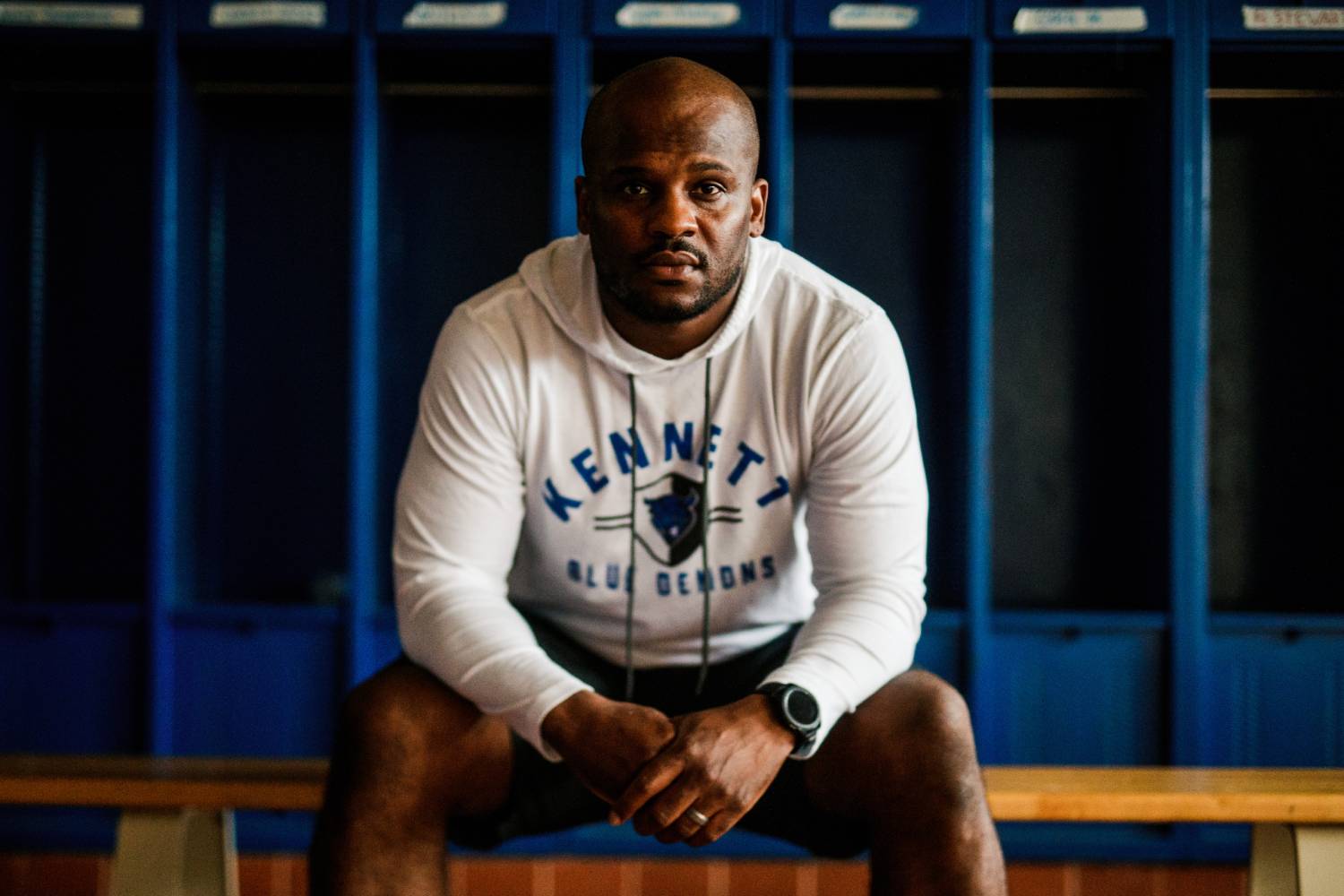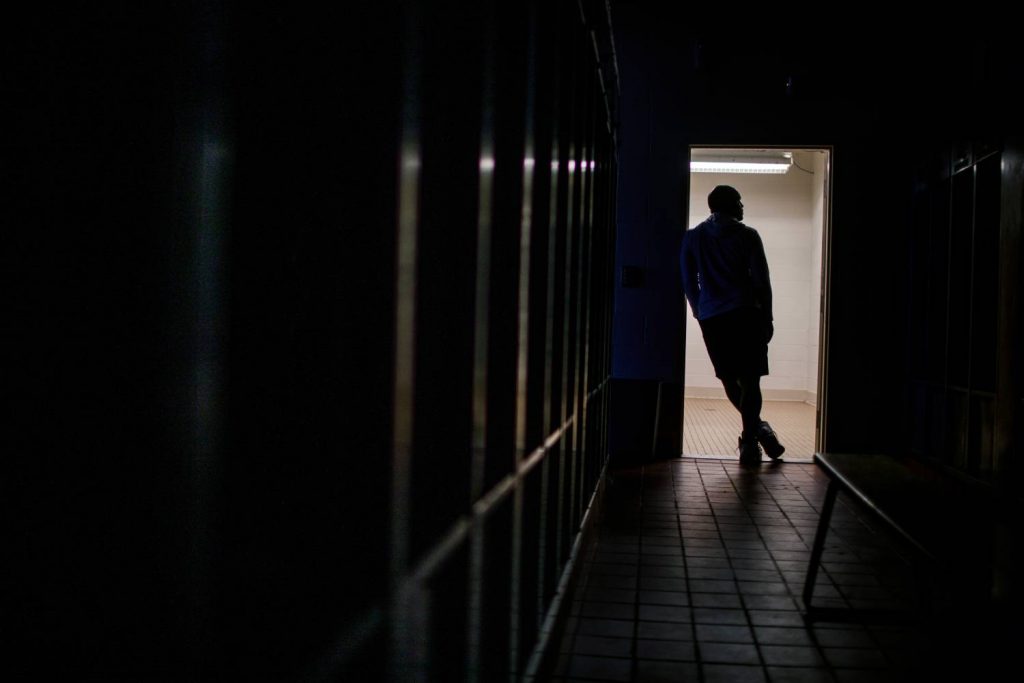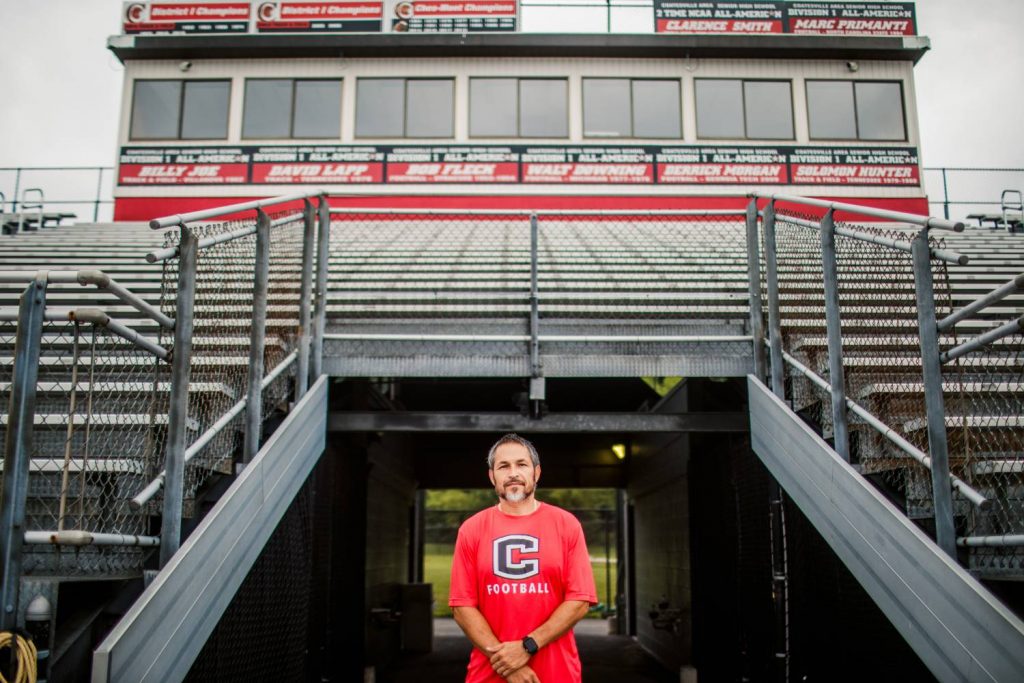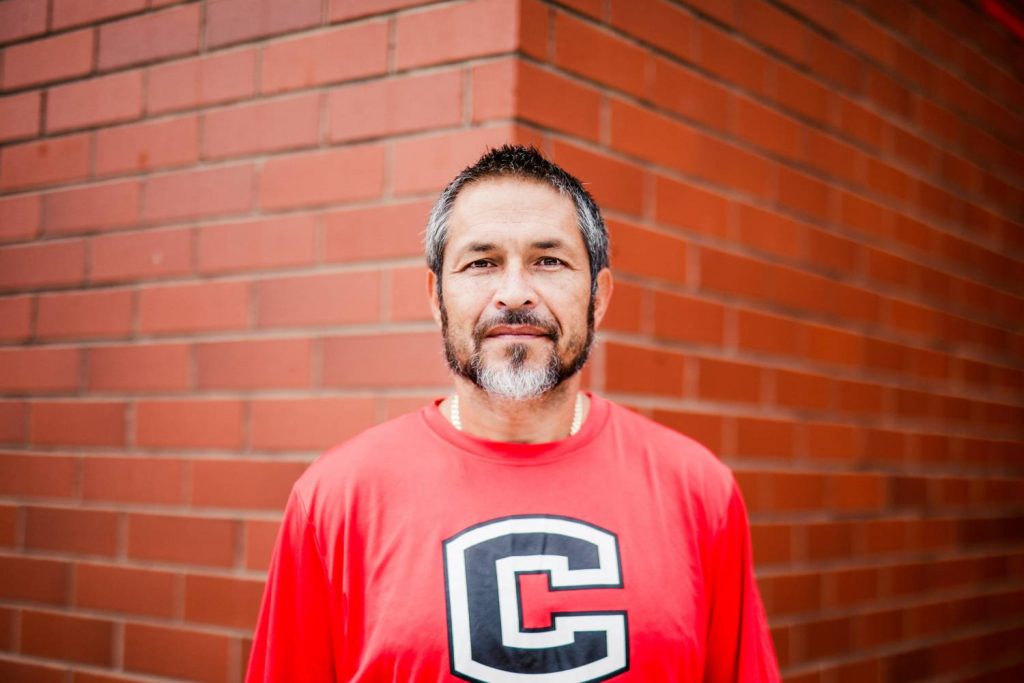
RACE TO THE TOP: Football coaches proud to make social issues, like racial inequality, a part of their locker rooms
A high school football locker room is often a portal where young men are transformed into grown men.
Athletes emerge, driven to prove themselves among their peers, learning from, adapting to and overcoming obstacles.
It’s also the perfect melting pot, often bringing together the largest, and most diverse, population in high school sports, metaphorically portraying what an idealistic society could look like: everyone starting at, or near, the same point, working hard to earn their status, but also together to accomplish for the greater good of the team.
In a summer where high school sports are in jeopardy due to the COVID-19 pandemic, workouts and training camps have been on hold, and space to discuss social justice has manifested.
Football, in this example specifically, can be a lot of things for male athletes, and one of the biggest is an avenue to be vulnerable about topics that one could otherwise shy away from.
The death of George Floyd on May 25 during an arrest by police officer, Derek Chauvin, in Minneapolis, sparked protests pleading for reform, as well as awareness and empathy and advocacy.
And that leads back to the high school football locker room, where three Ches-Mont League head coaches — Coatesville’s Matt Ortega, Downingtown East’s Mike Matta and Kennett’s Lance Frazier — gave perspective about the relationship between high school football and broaching such heavy, yet important, topics such as social justice.
* * *
Following Floyd’s death, Frazier took a few days to collect his thoughts before setting up a time to address his team, via Zoom.

Kennett football coach Lance Frazier — the only Black high school football coach in Chester County — opened some eyes on his football team when he shared stories of his son Kalen, who has been stopped and questioned by police simply for jogging in his Chester County neighborhood.
As the lone Black coach in Chester County, Frazier’s viewpoint held extra weight.
“There’s a lot of people unaware of the plight of an African American in this country. And for me, it was about, make this tangible, make these kids feel where you’re coming from,” Frazier said. “So I shared personal stories so they can know how I was brought up, some of the messaging that was happening in my household and some of my personal experiences with white Americans and also cops.”
For those listening on the Zoom call, a connection was made.
“You see kind of like light bulbs, that look,” Frazier said. “You saw faces of anger. You saw some disappointment. And then you see some puzzled faces, like ‘I had no clue.’ And you also got that, ‘Coach Frazier, that happened to you?’ Yeah, and you know what I represent, you know what type of person I am. We’re family and this is what this is about, this is why I’m sharing with you.”
What really hit home were the stories about Kalen Frazier, Lance’s son who is a rising junior, being stopped by police officers while training or jogging around their neighborhood.
“That’s a problem to me, where we have a mixed neighborhood where white families are walking their dogs and jogging, just like we are, and I find it hard to believe that they’re experiencing the same thing as we have,” Lance Frazier said. “Why are you stopping my son in the middle of the road? He’s just working out. It’s a real thing that’s happening in our country and until you’ve been exposed to it, or you’ve seen one of your friends, if you’re a white American, you don’t know it’s real. So I felt I had an obligation to tell them, that’s what the issues are.”
Ortega, who is Hispanic, has dealt with his own fair share of racism over the years, both personally and with his team.
As a leader in the most diverse school in the county, Ortega welcomes the latest calls for social justice, if not for his own team, but those who surround him.

Coatesville football coach Matt Ortega takes great pride in the diversity in his locker room, and his community. As coach at what is easily the most diverse school in the county, Ortega said, “We’ve already lived it. We’ve already come together and been an example, not just our team, but our school, of how you come together and get it done.”
“For us, we’re not really the ones who have to learn and grow from it because we’ve already done it,” Ortega said. “We’ve already lived it. We’ve already come together and been an example, not just our team, but our school, of how you come together and get it done. I think it’s the other schools who really need to have these conversations. Our push isn’t going to change much because this is something our community has overcome in the past so I think we’re gonna be built for it and be ready for it.”
Unlike any school in Chester County, the district encompasses the city of Coatesville, as well as the wooded suburbs and rural areas beyond. The juxtaposition has provided more of a communal feel than a divisive one, at least on the football team.
The “’Ville Mentality” is an endearing term used at Coatesville, overwhelming the differences in the community with a pride that comes from having gone through trials and experiencing outside assumptions.
“The kids know that we love them,” Ortega said. “It’s probably the biggest thing that I feel so happy being the coach at Coatesville is that right there, walking in that locker room, seeing that diversity. When I come out here on the sideline I always look up (into the stands) and it just puts chills down your back to see we’re just that old-school melting pot community. To see all the support we have, it actually energizes you and motivate you to keep working hard each year.”
Matta, who is white, said that he is organizing a small group of adults, and potentially a couple players, to have a conversation about social justice and how that fits into his team, going forward.
While Matta has not experienced the first-hand situations Frazier and Ortega have, his nearly 40 years of coaching continue to unearth more awareness. One particular conversation was with a few players who rehashed conversations with their parents on interacting with police officers.
“Several years ago we were in the weight room and I remember two former players of ours having that conversation when their dad or mom had that talk with them,” Matta said. “I’ve heard about that, but holy cow, no one ever had to have that talk with me. It’s a different set of circumstances they have to live under. I have four children, two males, and I’ve never had to have the talk with my kids. We live in the same Uwchlan Township. My kids go to the same high school. It’s almost like we’re living in a parallel universe. Their parents believe they have to have the talk and I never even thought about having that talk. That’s been eye-opening.”
* * *

Downingtown East head coach Mike Matta talks to his team after a 42-12 win over Archbishop Ryan.
Matta is known for his competitiveness and hatred of losing, but his scale for success is weighted more for his players’ impact off the field than on it.
“If you have a handle on your team and you really have a good, strong team, you should be able to give them more than just football,” Matta said. “You should be giving them things that will help them become better men. You want to win on Friday, which is important, but how good of a coach you are isn’t going to be measured until 10 years after they graduate and what kind of men they become. We firmly believe that.”
Frazier echoes the notion that being a football coach does not end on the gridiron.
“We’re educators,” Frazier said. “We work for school districts. We are district employees. I feel like any time you have a teaching opportunity, football, basketball, any sport or otherwise, you’re really doing a darn good job as a coach when everything you do is bigger than what you do on the field of play. This matter and beyond, you’re really connecting with your athletes, you’re really creating a family atmosphere when you’re teaching these kids how to be respectful, fair, truthful young men and women, and that goes far, far beyond Xs and Os and academics.”
In a world where everything becomes political, and the heart of matters is often ignored in lieu of one’s allegiances, the smaller, tighter-knit groups and teams provide a place for voices to be heard and opinions to be shared without being excoriated across social media.
Sports teams can be like family, but it’s Frazier’s hope the message is merely an echo of what his athletes have already heard.

Kennett football coach Lance Frazier — the only Black high school football coach in Chester County — opened some eyes on his football team when he shared stories of his son Kalen, who has been stopped and questioned by police simply for jogging in his Chester County neighborhood.
“Lives are being taken unfairly, unjustly,” Frazier said. “People are being put in a box just because what we look like, and that’s bull crap. If you don’t know, you know now. If you want to help the cause, if you have anyone in your family, any of your friends who are borderline racist, correct that crap. If it offends you, let them know, that’s not OK. Parents, start them young.”
The latest flurry of social justice protest is something Ortega would love to expand.
“When you come here and then you travel down the street 20, 30 minutes and you see what they have and travel over there and see what they have, it’s not a level playing field,” Ortega said. “It’s not even close and it smacks you in the face. … This thing that happened helps you be so much more aware of everything around you that’s a social injustice.”
The video of Floyd’s death was an image no one could deny, and while Ortega realizes the fight for school funding is much more hidden, he spoke with passion in regards to his players, and their classmates, benefitting from the same advantages as their neighboring districts.
“If you would sit down and look at our district and look at some of the surrounding districts, these politicians know exactly what’s going on and they are absolutely turning a cheek away,” Ortega said. “I can say that because my lifelong experience has been in schools like Coatesville. It’s an absolute injustice in terms of the amount of funding to school districts like ours compared to school districts that have more money and school districts that have a higher white population. It’s an absolute crime and that’s the one thing, as a district, we have to overcome here at Coatesville. We have this race issue going on, and now we have to deal with another one that, as a school district, we have to battle, too.”
It’s a fight the athletes may not even realize until later in life, but seeing coaches stick up for such causes is something likely not lost on them, whether it be by protest or simply not ignoring the issue.
“Systemic racism, we can’t turn our heads and say it’s not there,” Matta said. “If you say there’s no systemic racism, you’re adding to the systemic racism quotient.”
* * *
Ortega recalled a moment from his senior year at Central Dauphin High, outside of Harrisburg, after having spent his first three years at nearby — but very different — Steelton.

Coatesville football coach Matt Ortega takes great pride in the diversity in his locker room, and his community. As coach at what is easily the most diverse school in the county, Ortega said, “We’ve already lived it. We’ve already come together and been an example, not just our team, but our school, of how you come together and get it done.”
“My last year, I went to a very rich suburb school and it was an eye-opener,” Ortega said. “The eye-opener was listening to those kids at the cafeteria table talking about those kids that came from where I came from. And I couldn’t stand it. I sit there and think, they’re judging our kids here, and yeah they may be living in half-a-million dollar houses, but they have just as many problems, if not more, because they have money. I struggled that year because such an image was put on a community school like ours.”
While Frazier was a member of the Dallas Cowboys in the mid-2000s, he worked for a department store in the offseason. One night he was followed by a security guard and confronted about whether he had stolen the goods in his bag.
“Sometimes, even from a socioeconomic or financial perspective, you’re accepted in that arena when you half-made it or you have some sort of moxie or clout behind you,” Frazier said. “But as soon as you leave that arena, I’m still Lance Frazier from Delray Beach, Florida, the little black kid, who’s instantly a threat just because he’s black or expected to commit crime, just because I’m African American, and that’s a problem.”
The experiences coaches have gone through give them perspective and a platform to impact the next generation, and in a time when solutions seem unreachable, and promises can feel shallow, humble and honest conversations can go a long way.
“I acknowledge there’s systemic racism and I also have no problem saying that Black Lives Matter,” Matta said. “I say those two things with conviction and confidence. I think it’s incumbent on all of us to not stand for systemic racism. I don’t think there’s any debate what is happening to people of color in the community happens at a lot more alarming rate than it does to people without color.”
Empathy, instead of excuses, is Frazier’s plea.
“We can’t be dismissive about it,” Frazier said. “What I’ve heard over the past fews weeks is, there’s a group of people that try to make excuses. There’s a group of people who are detractors. There’s a group of people who try to judge the situations, instead of admitting there’s a problem. They want to detract away from what the issue is. We’re going to get nowhere like that.”
Though the process is slow, Ortega is optimistic about the future.
“In the past, even though we haven’t fully overcome it in the last 100 years, we’re making strides and getting better,” Ortega said. “I do feel like this one here is going to help us make the biggest jump as a society because it’s the one that’s made us all aware. White, Black, Hispanic, we have to analyze and re-evaluate things and hopefully it’s going to help make the biggest jump towards equality with all races in our country.”

